Events
Muir, Social Aspects
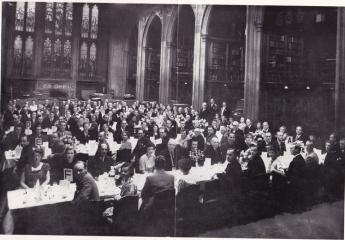
The Social Aspect of the Conference
By P. H. Muir
The greatest and most fantastically successful week in the history of the A.B.A. is over, and one can breathe again. Gasping a little, one looks back over the week's festivities with satisfaction and with the feeling that we have welcomed and honoured our guests to the full measure of the friendship and goodwill that we bear them.
From the fringes of the Polar Sea and from both shores of the Mediterranean; from tiny Denmark and from the vast United States, extremes were meeting in the land of compromise and it was evident from the moment when we foregathered on the Monday morning that the signs were auspicious. Moreover the stark and picturesque figure of Ian Grant in his kilt was an augury that Britain was on her mettle.
Scotland, indeed, made another early contribution to the welfare of nations when, at luncheon, the chief topic of conversation in a dozen languages was of the nature and habitat of the delicious bird that formed the main course. A form of partridge, thought some, others esteemed it an unusual or exotic form of quail, while others again were convinced that it was a young pheasant. Some had foreseen the possibility of perplexity, and naturalists were seen wagging their heads knowingly, if a little doubtfully, at Lagopus scoticus. The French-speaking were mystified rather than enlightened by coq de bruyere, and the German-speaking got little further with schottisches Schneehuhn: while the Scandinavians made frantic notes on learning that the Orkneyinga Saga contained a reference to it in the year 1157? But there was general agreement on the delectability of the small bird, and when one overseas visitor solemnly declared that the British Parliamentary summer recess begins on August 12th because grouse-shooting begins on that day, he was, very wisely, not contradicted.
After lunch on Monday coaches awaited us for a tour of London, which, in one coach at least, was not less remarkable for the standard and emphasis of the information given by the guide than for the sights seen. We were bombarded with statements - one doubts if they were always facts - about the weight of this statue and the length of that building; Piccadilly Circus was, of course, "the Scotchman's cinema"; a famous hotel occasioned detailed accounts of the rent paid by the Aga Khan for a suite there; and infinite pains, accompanied by the necessity for much backing and filling on the part of our lengthy vehicle, went to the location of the fragments of London's Roman Wall, which, to tell the truth, were hardly distinguishable from the devastated basements surrounding them. Our member, Mr. E. Franco, gave the first proof of his remarkable command of the French language, which won him so many praises from our visitors, by faithfully and - even more remarkable - intelligibly translating this curious jargon into excellent French.
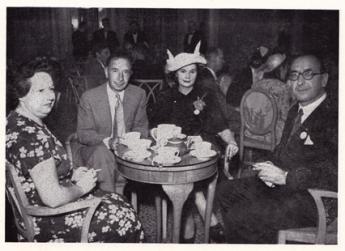
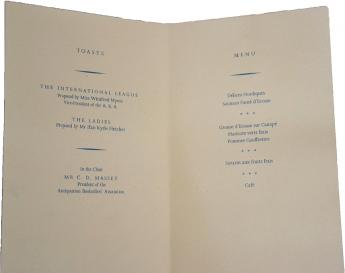
London's pomp and circumstance came to effective life at the Guildhall banquet in the evening. It is easy to be impatient of formality, but where ancient traditions are concerned it is not merely indispensable, but positively welcome, because it provides the atmosphere and background for the occasion. The official reception of the guests by Mr. President Kundig and his lady, the precedence and protocol by which the guests were called to their feet at the tables for the entry of My Lord Mayor, his official guardians and our own chief executive; the majestic and stentorian interventions of the official toastmaster, and the time-honoured roster of the toasts themselves, each added some necessary touch to the impressive and agreeable picture and its ancient background. The occasion was festive, and the other features served to remind us that our purpose was a double one-to meet and enjoy the cordial fraternity of our fellows, but also to perform a service to a community, the community of our trade in every corner of the world.
On Tuesday, two other great British institutions received us and took us behind the scenes. No more than a glimpse of the riches of the British Museum could be seen in our short visit, but the efficiency of the Museum arrangements did result in producing the maximum effect in a minimum of space and time.
In the early evening the British Council received our overseas guests in their charming Georgian drawing room in Portland Place, and their lavish hospitality emphasised the point of Sir Stanley Unwin's brief but comprehensive explanation of the Council's raison d'être. M. Kundig replied, and expressed delight at emerging from an atmosphere of dead authors and publishers to meet a publisher who is really alive. Sir Stanley was understood to refer to the enviable lot of those who have to deal only with authors who are dead.
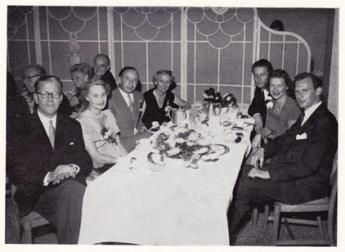
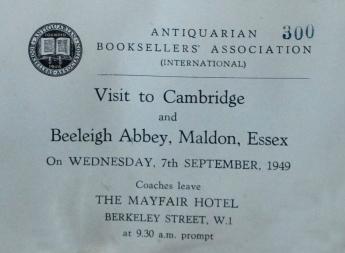
Wednesday was one of the high-lights of the week. Although the Cambridge colleges were closed for the long vacation, three of them - St. John's, Corpus Christi and Queen's - were especially opened for us, and their masters and/or librarians interrupted their own holidays to show us round. After lunch at the University Arms we were most admirably and efficiently shepherded through King's College Chapel by its college librarian, a figure especially close to us all because of his erstwhile association with our own trade - Mr. A. N. L. Munby. Many of us expressed, and all of us felt, a deep debt of gratitude to Mr. Leslie Smith, of Deighton, Bell, who had organised so successfully our visit to the University town.
Delays, which had already caused a distressingly late arrival at Cambridge, accumulated during the day, and we were actually two hours behind schedule when we arrived at Beeleigh Abbey. It is no easy matter just now to act as host to more than one hundred visitors, even if everything goes quite smoothly, and it would have been no wonder if our exceedingly late arrival had wrecked the party. In fact, Mr. and Mrs. Foyle received us with an ease and charm of manner that gave no hint of the disturbance we must have caused them. This set the keynote for an occasion which was an unqualified triumph, as we were received by the Mayor of Maldon and presented with pretty buttonholes as we arrived.
The staff and the plenteous refreshment of every kind then withstood a concentrated and persistent onslaught which, despite the determined way in which it was pressed home, exhausted neither. Indeed, we telescoped three meals into one-beginning with tea or coffee and sandwiches, we were soon at the cocktail stage, proceeding immediately thereafter to a cold-buffet supper washed down with champagne, after which the multitude rendered its thanks in song.
At the height of the festivities, our host produced an unexpected guest, even more belatedly arrived than most of us. His country of origin seemed a little uncertain, and his choice of costume, doubtless a well-meant attempt to conform with English customs - an Ascot topper, blue blazer and flannel trousers - contrasted violently with a flaming beard of patriarchal dimensions and a monocle. But he passed amicably amongst us, leaning on a malacca cane, and was observed to greet with especial cordiality Mr. Ernest Maggs, whom he addressed as "Tovarisch." What finally gave the show away was less the accent than the timbre of a voice now as familiar on the League's platform as in the rostrum at Place du Port - for it was none other than our protean President, W.S.K.
The inexhaustible hospitality and geniality of our host and hostess would probably have extended to bedding us all down for the night, but in the interests of our coach-drivers we felt compelled to leave at last, and our passage was marked by the sound of songs seldom heard on Essex roads, and little understood by Essex ears-songs from all quarters of Europe, the round being taken up by every country in turn. If any lingering trace of stiffness or standoffishness remained it must have been dissolved on Wednesday. A truly memorable day.
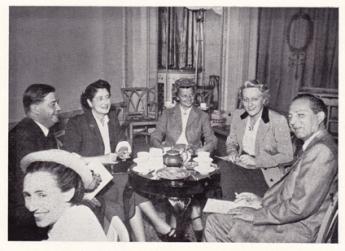
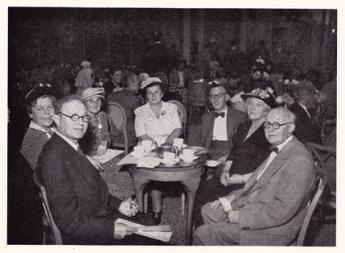
On Thursday evening we attended the Promenade Concert to hear a programme of music by Mozart and Schubert which delighted all those present and might have been arranged to symbolise the admission into the League of the countrymen of these great composers. Perhaps next year's programme will include a concert of American music!
The Windsor trip on Friday was again a peep behind the scenes, when Sir Owen Morshead, the King's Librarian, conducted us through the State Apartments and the Royal Library, expounding the great treasures laid out for our inspection. Foreign-speaking guides hovered around the party to help those few who could not follow the carefully chosen and precisely spoken words of Sir Owen himself. Discussion over the single and most desirable choice extended all the way from the Leonardo notebooks to the Sobieski Book of Hours, while there were those who put in a word for General Alexander's famous telegram after the African campaign.
Saturday evening crowned everything. Not only was it the most widely attended of all the functions; not only were there witty and graceful speeches from every delegation, many of them set off by musical toasts excellently sung in different languages; above and beyond all this was the evidence of a depth of feeling, a sense of dedication, which had been accumulating all the week, and which now seemed to issue forth and surround us all with an aura of benediction such as it rare in any gathering, and especially triumphal where so many different nationalities and so many temperaments of fundamental variety contributed.
Some of our overseas friends had made considerable journeys at great personal sacrifice to attend the Conference. We hope and believe that the farewell banquet symbolised for them, as it did for us, the affection in which we hold them all.
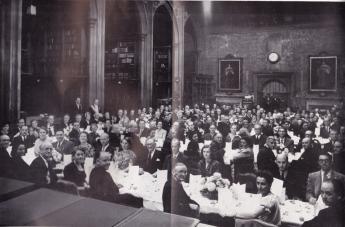
(Reprinted from "The Clique" by kind permission of the Editor. Published in the ABA Newsletter, Special Issue 1949)
